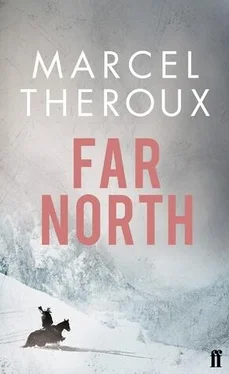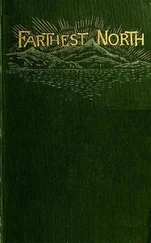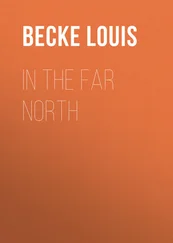Stepan said he’d been in a plane as a child and visited the Black Sea. He said the water was warm as a bath. He said there were fields of vines as far as the eye could see. About flying, he couldn’t remember anything except that it had made his ears hurt.
Tolya had been trained for the priesthood. He had been to an orthodox seminary in the west and then sent to his own church in the Buryat region. He said his parishioners had been without a priest for so long that they did all his cooking and cleaning for him. He lived like a lord and spent most of his spare time painting icons. He reached into his jacket and pulled out a leather pouch with a tiny portrait in it which he said was his own work. It went round the group, just like the bottle had, from hand to hand.
It was a Mary and Child, painted tiny as can be. Osip held it for a long while, and he actually kissed its tin frame before he passed it to me to have a look at.
The icon itself was no more than two inches square. The frame was warm from Tolya’s body. I’m no judge of that kind of workmanship, but it must have taken a steady hand to be able to paint that small with brushes.
Tolya said that when the hungry times came, his village was still living well. The villagers were well off for food — the hot weather that brought drought to the south just made their growing season longer.
This village was about a hundred kilometres from Ulan Ude, and traders began to come from the city and offer them high prices for food. Pretty soon, the villagers stopped selling. Prices were rising so quick that they figured better to hang on until they topped out. Tolya claimed he warned the villagers, but it did no good. The people who turned up next were full of righteous anger that the villagers were chiselling them and starving their children. Then they came mob-handed and took the food and butchered the ones who resisted.
*
Felix asked how many of us had grown up in a proper city like this one. None of us had. And none apart from me even had parents who were city-dwellers. That was no accident. Without power or clean water, dysentery and thirst finished them off quicker than any poison.
‘What about you, Makepeace?’ said Osip, not at all in an unfriendly way. I was the only one who had said nothing about my past life. ‘How did you come by that?’
‘Someone splashed lye on me,’ I said. There was a pause as though they expected me to go on, but I wasn’t minded to tell them about Eben Callard and the bad thing that had been done to me.
Tolya put a candle in a battered lantern. We had to make do without a fire because all the wowe’d gathered was tainted. He stood the lantern beside him in such a way that the light bronzed him and his fur clothes.
Suddenly it seemed to me like he’d planned everything this way, the drinking, the stories, and now the lantern like a lamp on an altar, just as he must have planned the services he read to his parishioners in the old days. He said he knew how much we must all miss the old life, and there was no chance of bringing it back in our lifetimes. That was in the way of things: civilizations had risen and fallen and there was nothing to be done about it. Then he said we were lucky enough to be part of a plan to put things back on the road to how they were.
The icon had made its way round the group back to him. He held it in his hand and talked of his life in the seminary. He said that writings that were copied from monk to monk kept alive knowledge that would otherwise have been lost.
I’ll give him this: he had a beautiful, deep voice, and a kind of priestly calm about him. And the men had drunk enough to be suggestible. Once he started unfolding his story, he had us hooked, because the words we were hearing were what we all wanted to hear.
*
Once upon a time, he said, the Zone had been just what it looked like from the bridge — a big industrial city of more than a hundred thousand souls, called Polyn.
The part that lay on the far side of the river was at least three hundred years old. It had been founded as a port for river traffic. Fur and timber and gold coming out of the Far North used to be shipped from here to roads and railheads in the south. The loads moved on barges part of the year, and in the winter months, before the river was embanked and it still froze hard, they moved on the ice.
But beyond what was visible from the bridge in daylight, lay a whole newer city. This place, almost a second separate city, had been built no more than half a century before our own time. It had been the most advanced city anywhere on earth. And it was put up here because the work that went on in it was meant to be secret.
A place with too many links to other cities wouldn’t do, and a place that was smack-dab in the wilderness would equally attract the wrong kind of interest, so its founders planned it to look like nothing more than an offshoot of Polyn. The new city never had a name of its own, and for ten or twenty years after it was built, the government wouldn’t admit it was any such thing. This secret city was known as Polyn 66 after the line of latitude it lay on.
The government drew to Polyn 66 the brightest people of the time, doctors, professors, scientists, and put them to work in factories and institutes of higher learning. You needed special passes to be allowed to enter the precincts of Polyn 66. The ordinary citizens of Polyn, for instance, were forbidden to travel there, and there were severe penalties if they were found there without the correct permission.
Aside from its being much colder than most of the scientists were used to, the life the city offered was a very comfortable one, with big apartments, high salaries, and good food, some of it brought in by air out of season.
There was no train to the city, and no road out of it. The only practical way to reach it in those days was by air. The taiga surrounded it on three sides like a moat of trees, and on the fou earth.de, Polyn stood between it and the Lena.
The story is that in its heyday, Polyn 66 was a real Sodom. Unless you have a real love of hunting and ice-fishing, the Far North doesn’t offer much for your leisure hours. They had theatres and an opera house and such like, but a great many people chose to spend their free time drinking, and going to bed with each other’s spouses.
But it’s what they got up to in their working hours that made them special. They were like the brain of the human race, puzzling out solutions to problems that had taxed us since we learned to make sparks from flint. No one alive can begin to guess at the sum of what they achieved, but it’s fair to say there’s not a branch of human knowledge that they didn’t add something to. They made better kinds of fuels, more deadly weapons, more fruitful crops. They looked through telescopes at the stars and made plans for carrying us into space. The scope of their work gave them an outlook different to what an ordinary man has. Every day they wrestled with the births and deaths of stars and civilizations. They thought in terms of Genesis and Apocalypse. How to scorch the life out of the planet, and how to bring it back in the aftermath.
Perhaps they tackled things that we don’t have the right to understand: how to breathe life back into a corpse, how to double the lifespan of a person, how to engender a child without the act of kind.
Because of the city’s great importance, Tolya said, the government had never abandoned it. Its food supply had been more or less constant. And when war and shortages were threatening it with chaos, its inhabitants were moved to safety. They were put in planes and flown out west and the city was left to crumble.
Left in the city was the fruit of all those years’ work.
‘You remember in Genesis,’ said Tolya, ‘that god puts an angel with a flaming sword to guard Eden after Adam and Eve have been expelled?’
Читать дальше












